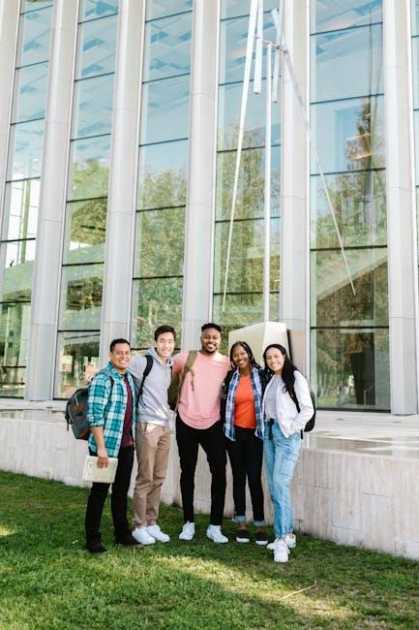Study in the Netherlands: An In-Depth guide to Applying, Navigating the Visa Process, adn Choosing the Best Universities in 2025
As the sun rises over the picturesque canals of Amsterdam and the vibrant windmills of the Dutch countryside turn gently in the breeze, a world of prospect awaits for those considering higher education in the Netherlands. Renowned for its innovative approach to learning and diverse, multicultural environment, this Scandinavian gem has become a beacon for students from around the globe. With a remarkable array of internationally recognized universities and programs, many offered in English, the Netherlands stands out as a destination that seamlessly blends academic rigor with cultural richness.
But embarking on this exciting educational journey requires careful planning and understanding of the request process, visa requirements, and selection of universities. In this article, we’ll delve into everything aspiring students need to know about studying in the Netherlands in 2025—from the steps to secure your acceptance to navigating the often complex visa process, and identifying the institutions that will help shape your future. Whether you’re drawn by the promise of world-class education or the allure of a vibrant, progressive society, join us as we explore the ins and outs of making your dutch academic dream a reality.
Navigating Your Study Journey in the Netherlands
Embarking on your academic adventure in the Netherlands offers a unique blend of high-quality education and an enriching cultural experience. To start, itS essential to choose the right program and university that aligns with your aspirations. Renowned for their innovative teaching methods, many Dutch universities rank among the top in global listings.Onc you’ve identified your desired course, the application process typically involves submitting your academic transcripts, proof of english proficiency, and a motivational letter. Early applications are encouraged as seats can fill rapidly, especially for popular programs.
As you prepare for your new life, be mindful of the visa process, which can be quite straightforward yet requires careful attention to detail. International students from outside the EU will generally need a student residence permit,which can be applied for through your university. Below are some key requirements to keep in mind:
- Acceptance letter: Proof of enrollment in a qualifying program.
- Financial Evidence: Proof of sufficient funds to support your stay.
- Health Insurance: Coverage that meets Dutch requirements.
Understanding the local culture and social norms will greatly enhance your experience. The Netherlands is famous for its international environment, which can be remarkably welcoming. Universities often host various events to help students integrate and network. Additionally, encountering the charming towns, picturesque canals, and vibrant cities will enrich your study journey.
Essential Steps for a Smooth Application Process
Navigating the application process for studying in the Netherlands can seem overwhelming, but breaking it down into manageable steps can help ensure a successful experience. Start by researching universities and their offered programs to find the best fit for your academic and career goals. once you’ve identified your preferred institutions, gather all required documents, including transcripts, language proficiency test scores (such as IELTS or TOEFL), and statement of purpose. Remember to pay attention to each university’s specific requirements, as they can vary significantly.
After submitting your application, stay organized by creating a timeline for important deadlines, such as visa application dates and enrollment confirmations. To secure your stay in the Netherlands, familiarize yourself with the visa application process early on.This includes preparing necessary documents like your acceptance letter, proof of financial means, and health insurance. Joining forums or social media groups related to studying in the netherlands can provide valuable insights and support from fellow students who have been through the process.
Understanding the Visa Requirements for International Students
When planning to study in the Netherlands, understanding the visa requirements is crucial for a smooth transition. International students generally need to apply for a Student Visa (MVV) if their program exceeds 90 days.The application process can seem daunting, but knowing what documents are necessary can make it less intimidating. Typically, you will need:
- Valid Passport: A passport that remains valid for the duration of your stay.
- Proof of Enrolment: An official letter of acceptance from your chosen institution.
- Financial Proof: Evidence of sufficient funds to cover living expenses and tuition fees.
- Health Insurance: Valid health insurance covering your time in the Netherlands.
Once you have your required documents ready, the application must be submitted to the Dutch consulate or embassy in your home country. Upon approval of your visa, you will receive a residence permit, allowing you to stay in the Netherlands during your studies.it’s important to also keep track of your visa’s expiration date and any necessary renewals. The table below outlines the key steps in the visa application process,which can vary slightly based on your home country and personal circumstances:
| Step | Description |
|---|---|
| 1 | Gather Required Documents |
| 2 | Submit Visa Application |
| 3 | Receive Visa Approval |
| 4 | Travel to the Netherlands |
| 5 | register with Local Authorities |
Exploring Top Universities and Programs to Consider
When considering studying in the Netherlands,it’s essential to explore the universities that are renowned for their academic excellence and diverse programs. Several institutions stand out, offering unique educational experiences tailored to international students. Among thes, University of Amsterdam, known for its research-oriented approach, and Delft University of Technology, acclaimed for engineering and technical studies, offer competitive curriculums that attract students worldwide. Additionally, Eindhoven University of Technology is celebrated for its innovation-focused programs in engineering and applied sciences.
Various other universities also provide specialized courses that cater to the ever-evolving job market. For instance, Wageningen University focuses on life sciences and sustainability, making it a prime choice for those interested in environmental studies. Meanwhile, Leiden University excels in the arts and humanities, offering in-depth programs that foster critical thinking and cultural awareness. Here’s a brief overview of some top universities and their standout programs:
| University | Notable Programs |
|---|---|
| University of Amsterdam | social Sciences, Media Studies |
| Delft University of Technology | Engineering, Architecture |
| Wageningen University | Agriculture, Environmental Science |
| Eindhoven University of Technology | Facts Technology, Innovation Management |
| Leiden University | Law, International Relations |
Q&A
Title:
Q&A: Your Guide to Studying in the Netherlands
Q1: Why should I consider studying in the Netherlands?
A: The Netherlands is renowned for its high-quality education, innovative teaching methods, and international orientation. With universities consistently ranking among the best in the world, a degree from a Dutch institution is not only globally recognized but also offers a unique multicultural experience. Plus, the Dutch are known for their excellent English proficiency, making it easier for international students to adapt.
Q2: What are the first steps I should take when applying to universities in the Netherlands?
A: Start by researching your options! Explore universities and their specific programs to find one that aligns with your academic and career goals.Check admission requirements for international students, which often include proof of previous qualifications, language proficiency (usually in English), and sometimes a personal statement or portfolio. Once you have this information, gather your documents and begin the application process, often through the centralized system ‘Studielink’.
Q3: What is the typical application timeline?
A: It’s best to start the process early! Generally, applications for universities in the Netherlands open in October for programs starting the following academic year (September). Most deadlines fall between January and April, but it’s essential to check specific program deadlines. Preparing your documents, including motivation letters and language tests, may take time, so plan ahead!
Q4: What are the requirements for a student visa?
A: To obtain a student visa (MVV), you’ll need to be accepted into a recognized institution in the netherlands and demonstrate that you can support yourself financially. This typically includes proof of funds for living expenses and tuition fees. Additionally, you’ll need valid health insurance and a valid passport. Your university will often assist in the visa application process.
Q5: How long does the visa process take?
A: The visa processing time can vary, but generally, it takes about 4 to 8 weeks. To avoid delays, submit your application as soon as you have your acceptance letter and all necessary documents in order.If you are from certain countries, you may also be eligible for a streamlined procedure, so check with the Dutch embassy in your country.
Q6: What are some of the best universities in the Netherlands?
A: The Netherlands is home to several highly acclaimed universities. Some of the top-ranked include:
- Delft University of Technology – Known for engineering and technology.
- University of amsterdam – Offers a diverse range of programs and vibrant city life.
- Utrecht university – Renowned for research and a strong community.
- Leiden University - One of the oldest universities, famous for humanities and social sciences.
- Vrije Universiteit Amsterdam – Known for its academic climate and interdisciplinary programs.
Check the latest rankings to see where they stand, as they can change year to year!
Q7: Can I work while studying in the Netherlands?
A: Yes, as a non-EU/EEA student on a valid residence permit, you can work up to 16 hours per week during the academic year and full-time during the summer months. Just keep in mind that balancing work and study can be tricky, so ensure it doesn’t impact your academic performance! Be sure to apply for a work permit if needed.
Q8: What other tips do you have for a successful study abroad experience?
A: Embrace the culture! Engage with local traditions, enjoy the diverse cuisine, and make an effort to learn Dutch—it’s appreciated by locals. Additionally, connect with fellow international students for support and camaraderie. Don’t forget to explore the stunning landscapes,vibrant cities,and the rich past heritage the Netherlands has to offer.
Conclusion: Studying in the Netherlands can be an enlightening and transformative experience. With the right planning and an open mind, you’re set to thrive in this picturesque land of tulips and windmills! Whether you want to pursue a degree in science, arts, or anything in between, the Netherlands welcomes you with open arms. Happy studying!
final Thoughts
As we conclude our exploration of studying in the Netherlands,it’s clear that this vibrant country offers not just a high-quality education but also a unique cultural experience that enriches the journey of international students. From the application process to navigating visa requirements and identifying the best universities, embarking on your Dutch academic adventure is within reach.
The netherlands stands as a beacon of innovation, diversity, and academic excellence, inviting you to immerse yourself in a landscape where learning transcends customary boundaries. As you set out to take your next steps, remember that thorough preparation and understanding the specifics of this transformative experience can pave your way to success.
Whether you’re drawn by world-renowned institutions, the charm of picturesque cities, or the promise of a multinational environment, the journey ahead is both exciting and rewarding. May your aspirations become reality, and may your time in the Netherlands be filled with knowledge, growth, and unforgettable memories. happy studying!


















